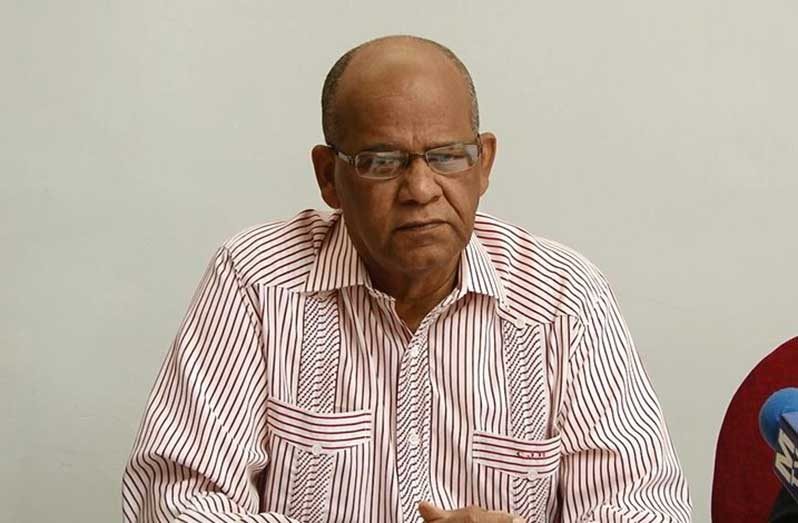–PPP’s Rohee endorses GECOM chair decision to rule out biometrics for 2025 Elections
CHAIRPERSON of the Guyana Elections Commission (GECOM), Justice (Ret’d) Claudette Singh, has ruled against introducing biometric fingerprint identification for voting in the upcoming 2025 General and Regional Elections, citing feasibility issues and limited time.
This decision, delivered by the chairperson on January 16, 2025, has been strongly supported by People’s Progressive Party/Civic (PPP/C)-nominated GECOM Commissioner and former Minister of Home Affairs, Clement Rohee, who described the ruling as “justiciable, practical, and realistic.”
The debate over incorporating biometric technology into the electoral process has been one of the most contentious issues in recent months, reflecting deeper political divisions within the commission and the broader society. In a recent opinion piece, Rohee said that discussions on the topic began after GECOM’s Chief Election Officer (CEO), Vishnu Persaud presented a feasibility study in May, 2024, titled ‘Feasibility Study for Introducing Digital Fingerprint Capture during Registration and Biometric Fingerprint Identification for Voting in Guyana.’ According to him, the study outlined potential advantages, challenges, and legal implications of adopting such a system. From the outset of discussions in October, 2024, Commissioner Rohee said he expressed firm opposition to the proposal. Speaking at a commission meeting, Rohee recalled arguing that the divide within GECOM over biometrics
mirrored a broader societal split, with opposing political parties taking entrenched positions on the issue. He said he underscored that GECOM, as a neutral body, must ensure any decisions on electoral reforms are based on thorough analysis and not partisan pressures. “I maintained that it would be logical to expect that the opposing views within the commission be recognised as a microcosm of what obtains in the wider society. In the circumstances, it was up to the commission to settle the matter.” Rohee said he highlighted key points from the feasibility study that informed his stance.
He explained: “I touched on the eight sections and sub-sections in the feasibility study, highlighting; ‘The challenges of using biometric fingerprint identification for voter identification and privacy concerns; the political considerations; the disadvantages of fingerprint recognition and predictable difficulties; the trust and confidence factors for GECOM and the experiences of several countries who rejected the use of biometric fingerprint identification for voting at national election.” Rohee noted that he also pointed out that introducing biometrics would require constitutional amendments, a lengthy and complex process.

“An important question the opposition inside and outside the commission has been unable to answer is whether the introduction of biometrics would require the retirement of the extant National Register of Registrants database and would necessitate the conduct of a fresh countrywide house-to-house registration exercise in time for election 2025,” he added.
The issue of biometrics has polarised Guyana’s political landscape. Opposition parties, including the Alliance For Change (AFC) and the People’s National Congress Reform (PNCR), have been vocal advocates for the system, arguing that it would enhance the credibility of the electoral process.
Rohee stated that PNCR GECOM Commissioner Vincent Alexander has frequently championed biometrics on public platforms, while PNCR Leader Aubrey Norton has reiterated the party’s support for the technology. Rohee noted that Vice President and PPP General Secretary, Dr. Bharrat Jagdeo, has strongly opposed the introduction of biometrics.
Rohee further criticised the opposition’s premature demands for biometrics, noting that some representatives even suggested postponing the 2025 elections. “One opposition spokesperson let the cat out of the bag, stating it is better to have no election than a bad election,” he revealed.
After months of deliberations, he stated that Justice Singh delivered a comprehensive ruling on the matter, citing logistical and temporal challenges. “With less than a year to go before these elections, and given the number of tasks that would need to be done before such a system can be properly
introduced, and all of the work already required to prepare for General and Regional Elections, I am convinced that this is not feasible within the time presently available,” he quoted her as saying. According to Commissioner Rohee, the ruling came after multiple rounds of discussions among commissioners, during which he consistently backed the chairperson’s cautious approach. Rohee revealed that during a meeting on December 17, 2024, he, along with PPP Commissioners Sase Gunraj and Manoj Narayan, supported the chairperson’s preliminary stance, which advocated for further examination before making a final decision.
He said Justice Singh’s ruling emphasised the importance of prioritising GECOM’s core mandate: delivering free, fair, and credible elections. Rohee quoted Justice Singh as saying, “We have not reached a stage in our deliberations where we can conclude that we could introduce digital fingerprint capture during registration and biometric fingerprint identification for voting’ and therefore, more work needs to be done on the matter by the commission.” Rohee, therefore, lauded the chairperson’s decision, describing it as is “justiciable, practical and realistic.”



.jpg)











